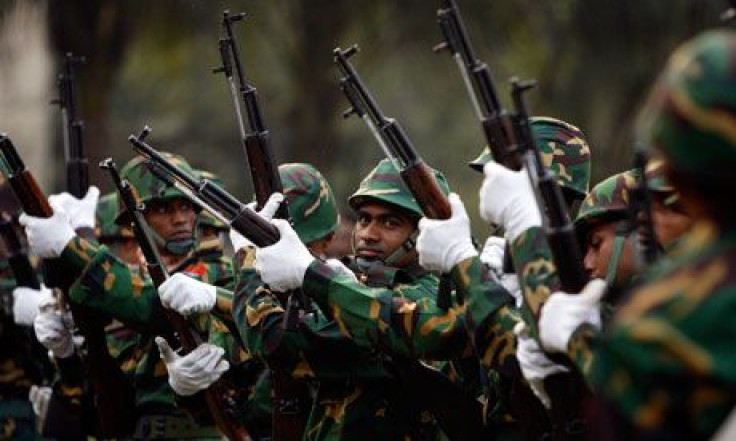Mutiny, But No Bounty: Bangladesh Court Sentences 152 Soldiers To Death For 2009 Massacre

A special court in Bangladesh has sentenced 152 people to death for their roles in a 2009 mutiny that led to a massacre. In February of that year, a group of Bangladesh Rifles (BDR), a paramilitary force associated with the military’s border police, embarked on a two-day mutiny in the capital, Dhaka.
The mutiny, which eventually spread to a dozen other towns and led to the deaths of about 74 people (including 57 army officers), was essentially sparked by a pay dispute -- lower ranking BDR soldiers were upset over the benefits and salaries paid to senior officers. The director-general of the BDR and his wife were among the dead following the orgy of killing. Many of the murder victims were dumped in sewers and shallow graves. The stand-off did not end until the newly elected government of Prime Minister Sheikh Hasina negotiated a settlement with the mutineers.
The death sentence verdicts bring an end to a two-year trial that involved 850 defendants (including 801 BDR members) and 654 prosecution witnesses. More than 150 defendants, primarily border guards, received life sentences, while about 277 others were acquitted. The remaining defendants received jail sentences of between three and 10 years. Lead prosecutor Baharul Islam described it as possibly “the largest [legal] case in the world’s history,” and definitely the longest and most costly trial in Bangladesh’s brief history. Indeed, according to BBC, it took the court several hours just to read out the verdicts. "The atrocities were so heinous that even the dead bodies were not given their rights," said Judge Mohammad Akhtaruzzaman as he delivered the verdicts. However, the judge also allowed that the defendants should have received higher pay and benefits in the first place.
Nonetheless, some of the defendants cried out when they heard their doom. One elderly condemned man shouted at the judge: "I am innocent. You will face Allah's wrath," while another screamed: "I don't need a life term. Hang me, hang me!” Human rights groups have already criticized the guilty verdicts, noting, among other things, that at least 50 other suspects died while in custody, while others escaped their jail cells. The trial also highlighted deep divisions between the civilian government of Hasina of the ruling Awami League Party and the conservative forces of the military who were perturbed by the Prime Minister’s refusal to let the army attack the mutineers (she opted to negotiate). In fact, soon after the mutiny, speculation arose in Bangladesh that the disturbance may have been a conspiracy by the opposition Bangladesh National party (BNP) to destabilize the newly elected government of Hasina.
Sabir Mustafa of BBC commented that while the defendants have the right to appeal their death sentences, the anger in the military is so great that it will be nearly be impossible for the condemned men to avoid the hangman’s noose.
BDNews24 of Bangladesh noted that since the mutiny, the BDR has been renamed Border Guard Bangladesh (BGB) and given new uniforms in order provide a fresh new appearance. The leader of the BGB, Director-General Major Gen. Aziz Ahmed, said he was happy with the verdicts. “We had long been waiting for this verdict. The verdict has helped BGB get rid of its smeared image,” Aziz told Bangladeshi media. “The punishment has been exemplary. It will heal the pain suffered by the family of the victims’ and console them. The souls of the martyred will rest in peace. I have lost many a [colleague]. This verdict has put me at peace as well.” Aziz added that he felt to sympathy for the condemned men.
© Copyright IBTimes 2024. All rights reserved.











